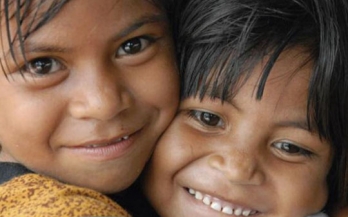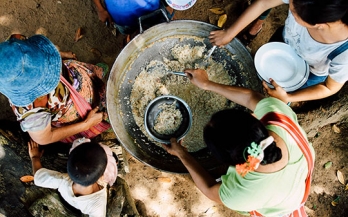This white paper makes the business case for investing in nutrition. It highlights three key points for investing in nutrition in agricultural supply chains: 1) the case for productivity, 2) the case for a secured healthy future workforce and 3) the case for brand integrity and ethical considerations.
This report highlights the successes of the global effort to eliminate iodine deficiency disorders as a public health problem. The report was commissioned as part of UNICEF-GAIN Partnership Project, funded by the Bill & Melinda Gates Foundation from 2008 to 2015, to improve iodine nutrition through salt iodisation.
A new call for action has been launched for national governments, donors, science and industry to join forces together to deliver cost-effective solutions to tackle malnutrition. The statement was coordinated through an Interagency Steering Committee which includes GAIN, UNICEF, World Bank, USAID among others.
This report summarises the current technical information about vitamin and mineral deficiencies and identifies gaps in data and programmes. In doing so, it identifies some elements of a globalised approach for the micronutrient sector.
This is a report of a stakeholder survey that was conducted to seek views on a proposed ten year plan to combat vitamin and mineral deficiencies. Interviews were conducted early in 2006 with 155 stakeholders from developing and developed countries, intergovernmental organisations, business and industry, nongovernmental organisations, university researchers, donors and financial institutions.
This report is the outcome of a desk research to assess the nutritional status and underlying causes among cocoa farming families in Ghana commissioned by the Sustainable Trade Initiative for their programme on the Cocoa Learning and Innovation Programme.
This report presents findings from a formative research and design case study carried out to explore infant and young child feeding behaviour in the region, and to understand its underlying motivations.
Adolescents embody the future – figuratively and, in the case of mothers, literally. If their nutrition status is poor, then nutrition throughout the lifecycle will be fragile. This report aims to address this issue in three ways.
This report provides an overview of the edible oil processing sector in Ethiopia. The mapping study focused on the administrative regions of Ethiopia where oil production takes place to provide prioritisation of efforts for further planning, technical assistance, monitoring, and research throughout the forthcoming edible oil fortification programme.
This document highlights the national and regional trends in adolescent nutritional status, dietary intake, early marriage, school enrolment and an outline of the subpopulations that are most vulnerable in Bangladesh. The aim of the research was to better guide interventions and monitor progress on Bangladeshi adolescents.










